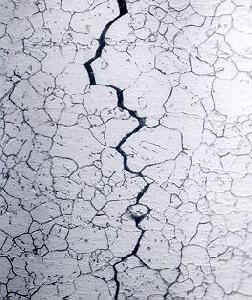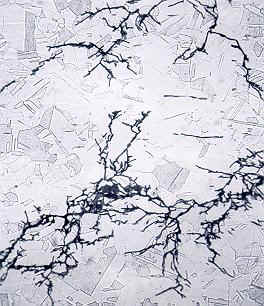Stress Corrosion Cracking (SCC)
Stress corrosion cracking is to bear the stress of the alloy in the corrosive environment because of strong expansion of the alternate failure pattern of a generic term. Stress corrosion cracking of brittle fracture surface, but it may also occur in high toughness materials. Stress corrosion cracking in the necessary condition is to have tensile strength (residual stress, whether or external stress, or both) and the existence of a specific corrosive medium. Type pattern formation and expansion of roughly perpendicular to the tensile strength. This led to the stress value of stress corrosion cracking, corrosion medium than there is no need of material stress fracture is much smaller.
At the micro level, through the grain as transgranular cracks crack extension along the grain boundaries as intergranular cracks map crack, when the stress corrosion cracking extended to one depth (here, bear the load of the material cross section The stress of it in the air in the fracture stress), then the normal material on the crack (in ductile materials, usually through microscopic defects in the aggregate) and disconnect.
Therefore, due to stress corrosion cracking and failure of parts of the section, will contain the characteristics of stress corrosion cracking of the region as well as micro-defects have been linked to aggregate the "dimple" area. Stress corrosion cracking (SCC) is the cracking induced from the combined influence of tensile stress and a corrosive environment. The impact of SCC on a material usually falls between dry cracking and the fatigue threshold of that material. The required tensile stresses may be in the form of directly applied stresses or in the form of residual stresses, see an example of SCC of an aircraft component.
The problem itself can be quite complex. The situation with buried pipelines is a good example of such complexity. The impact is most commonly catastrophic but rarely as it was for the historical failure of the UK Flixborough chemical reactor in 1974.
Cold deformation and forming, welding, heat treatment, machining and grinding can introduce residual stresses. The magnitude and importance of such stresses is often underestimated. The residual stresses set up as a result of welding operations tend to approach the yield strength. The build-up of corrosion products in confined spaces can also generate significant stresses and should not be overlooked. SCC usually occurs in certain specific alloy-environment-stress combinations.
Usually, most of the surface remains unattacked, but with fine cracks penetrating into the material. In the microstructure, these cracks can have an intergranular or a transgranular morphology. Macroscopically, SCC fractures have a brittle appearance. SCC is classified as a catastrophic form of corrosion, as the detection of such fine cracks can be very difficult and the damage not easily predicted. Experimental SCC data is notorious for a wide range of scatter. A disastrous failure may occur unexpectedly, with minimal overall material loss.
The micrograph on the right (X500) illustrates intergranular SCC of an Inconel Alloy heat exchanger tube with the crack following the grain boundaries. |

|
 |
The micrograph on the left (X300) illustrates SCC in a 316 stainless steel chemical processing piping system.Chloride stress corrosion cracking in austenitic stainless steel is characterized by the multi-branched "lightning bolt" transgranular crack pattern. |
The most effective means of preventing SCC are: 1) properly with the right materials; 2) reduce stresses; 3) remove critical environmental species such as hydroxides, chlorides, and oxygen; 4) and avoid stagnant areas and crevices in heat exchangers where chloride and hydroxide might become concentrated. Low alloy steels are less susceptible than high alloy steels, but they are subject to SCC in water containing chloride ions.
Chloride SCC
One of the most important forms of stress corrosion that concerns the nuclear industry is chloride stress corrosion. Chloride stress corrosion is a type of intergranular corrosion and occurs in austenitic stainless steel under tensile stress in the presence of oxygen, chloride ions, and high temperature. It is thought to start with chromium carbide deposits along grain boundaries that leave the metal open to corrosion. This form of corrosion is controlled by maintaining low chloride ion and oxygen content in the environment and use of low carbon steels.
Caustic SCC
the extensive qualification of Inconel for specific applications, a number of corrosion problems have arisen with Inconel tubing. Improved resistance to caustic stress corrosion cracking can be given to Inconel by heat treating it at 620°C to 705°C, depending upon prior solution treating temperature. Other problems that have been observed with Inconel include wastage, tube denting, pitting, and intergranular attack.
Related References:
1. austenitic stainless steel
2. Stress Corrosion Cracking SCC
3. Chloride Stress Corrosion Cracking (CLSCC)
4. Stress Corrosin Cracking SCC of Duplex Stainless Steel
5. Chloride Stress Corrosion Cracking in Austenitic Stainless Steel
6. Recommendations for Assessing Susceptibility to CLSCC
7. Main Findings on CLSCC in the Reactors
8. Literature Review to Chloride Stress Corrosion Cracking
9. CLSCC Chloride Stress Corrosion Cracking Mechanism
10. Factors Affecting CLSCC Chloride Stress Corrosion Cracking
11. Controlling Chloride Stress Corrosion Cracking
12. Structural Integrity Assessment
13. Non-Destructive Examination NDE
Stress Corrosion Cracking SCC of Duplex Stainless Steel
Residual Stress
Metallographic Test - Metallography Testing
Metallographic Test Report
Stress Corrosion Cracking (SCC)
Chloride Stress Corrosion Cracking
Corrosion of Piping
Corrosion Process
Surface Coatings for Corrosion
Corrosion Resistant Material
Bi- Metallic Corrosion.Galvanic Corrosion
Stainless Steel Corrosion
Corrosion of Piping
Corrosion Process
Surface Coatings for Corrosion
Corrosion Resistant Material
Bi- Metallic Corrosion.Galvanic Corrosion
Intergranular Corrosion
Intergranular Corrosion of Stainless Steel Tubes
Corrosion Resistant Stainless Steel Tube
Corrosion Resistance of Stainless Steel Tubes
Seawater Resistance of Stainless Steel Tubes
Corrosion Mechanism in Stainless Steel Tube
ASTM A262 Intergranular Corrosion Test IGC
ASTM E112 Standard Test Methods for Determining Average Grain Size
Methods of minimizing chloride stress corrosion cracking
|
